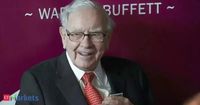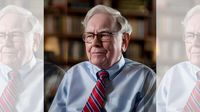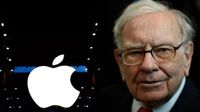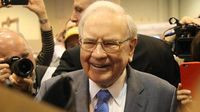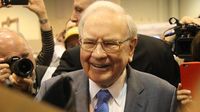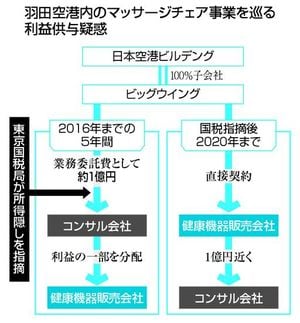In a dramatic financial landscape, billionaire investor Warren Buffett has emerged as a surprising victor amid a tumultuous market crash that has seen Wall Street lose nearly $8 trillion in value since the return of former President Donald Trump to the White House. The market turmoil intensified following Trump's announcement of reciprocal tariffs on imports, which sent shockwaves through global markets and caused significant declines in the fortunes of many tech giants.
On April 4, 2025, the Dow Jones Industrial Average plummeted 2,231 points, marking its worst single-day loss since March 2020. The S&P 500 dropped 6%, resulting in a staggering loss of $5 trillion in just 48 hours, while the Nasdaq fell 5.8%. The day before, on April 3, the world’s 500 richest individuals collectively lost $208 billion, with notable figures like Elon Musk, Jeff Bezos, and Mark Zuckerberg experiencing massive declines in their net worths.
Elon Musk saw his wealth dip by $130 billion to $302 billion, while Jeff Bezos lost $45.2 billion, bringing his net worth down to $193 billion. Meta CEO Mark Zuckerberg's fortune dropped by $28.1 billion to $179 billion, and Bernard Arnault, chairman of LVMH, experienced an $18.6 billion decline to $158 billion. Even Bill Gates was not spared, with a $3.38 billion dip bringing him to $155 billion.
However, amidst this chaos, Warren Buffett, known as the ‘Oracle of Omaha,’ not only weathered the storm but actually gained $12.7 billion year-to-date, bringing his net worth to $155 billion, which puts him on par with Gates. Buffett's resilience can be attributed to his strategic investment approach and a well-timed cash hoard.
Buffett’s investment firm, Berkshire Hathaway, has amassed a record cash pile of $344 billion, primarily due to a net selling strategy over the past nine quarters. This cautious approach has seen Buffett reduce positions in several major companies, including Ulta Beauty, Bank of America, Capital One Financial, Citigroup, Nu Holdings, Charter Communications, T-Mobile US, and DaVita.
As the market indicators signal potential overvaluation, the Buffett Indicator—a comparison of the total market capitalization of U.S. stocks to U.S. GDP—currently sits at 187%. Any value above 158% typically indicates that stock prices are significantly overvalued, which may explain Buffett's reluctance to make major acquisitions during this period.
Furthermore, with the looming threat of a recession, as predicted by JP Morgan's chief U.S. economist Michael Feroli, who forecasts a contraction of 1% in Q3 and another 0.5% in Q4, Buffett's strategy of holding cash positions allows Berkshire Hathaway to capitalize on potential buying opportunities when the market stabilizes.
Buffett has also taken steps to protect his investments amid the tariff-induced market crash. For instance, he significantly reduced Berkshire’s stake in Apple by two-thirds before the stock plunged 28%. Apple shares, a significant part of Berkshire's portfolio, have dropped nearly 13% since Trump's tariff announcement on April 2, closing at $188.38 on April 4.
Despite the turmoil, analysts remain cautiously optimistic about Apple's long-term prospects. Thirteen out of thirty-three Wall Street analysts still rate Apple as a 'buy', while five recommend selling and the remaining eleven suggest holding the stock. Apple constitutes 22.2% of Berkshire Hathaway's portfolio, valued at approximately $565 billion based on current market prices.
In the wake of the tariff announcement, which imposed a 10% base tariff on all countries with additional tariffs based on trade deficits, the market's response has been swift and severe. Countries like China and Vietnam face tariffs as high as 47%, which has raised concerns about the broader implications for international trade and economic stability.
Buffett has refrained from commenting on Trump's tariffs directly, despite rumors suggesting his support. Berkshire Hathaway released a statement on April 4, debunking claims that Buffett praised Trump's economic moves, stating, "There are reports currently circulating on social media regarding comments allegedly made by Warren E. Buffett. All such reports are false." This clarification underscores Buffett's cautious approach to political commentary amid market volatility.
As investors look for guidance in these uncertain times, Buffett's actions may serve as a roadmap for risk management. His strategy of building a cash reserve allows for flexibility in taking advantage of market dips, a tactic that has historically proven effective.
In conclusion, while many investors are reeling from the recent market downturn, Warren Buffett's calculated moves have positioned him to not just survive but thrive. His focus on building a cash war chest and reducing exposure to overvalued stocks suggests that he is preparing for a potential market correction. As the economic landscape continues to evolve, Buffett's investment philosophy remains a beacon for those navigating the complexities of the stock market.
